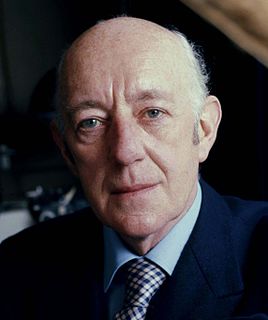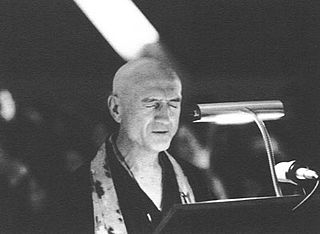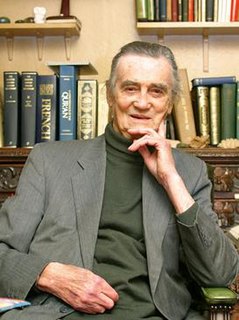A Quote by Alan Watts
One's life is an act with no actor, and thus it has always been recognized that the insane man that has lost his mind is a parody of the sage who has transcended his ego. If one is paranoid, the other is metanoid.
Related Quotes
What, then, is that incalculable feeling that deprives the mind of the sleep necessary to life? A world that can be explained even with bad reasons is a familiar world. But, on the other hand, in a universe suddenly divested of illusions and lights, man feels an alien, a stranger. His exile is without remedy since he is deprived of the memory of a lost home or the hope of a promised land. This divorce between man and his life, the actor and his setting, is properly the feeling of absurdity.
When compiling his great dictionary, the young Noah Webster travels to the Himalayas, where he climbs to the cave of the world's wises man. 'O, great sage,' he says, 'tell me the meaning of life.' The sage sits Noah at his feet and, with great solemnity, commences to unfold the meaning of life. When finished, he places a hand on the young man's shoulder and says, 'Do you have any other questions, my son?' Noah flips a page in his notebook and says, 'You wouldn't know the meaning of lift, would you?'
It is not seen as insane when a fighter, under an attack that will inevitable lead to his death, chooses to take his own life first. In fact, this act has been encouraged for centuries, and is accepted even now as an honorable reason to do the deed. How is it any different when you are under attack by your own mind?
The Wise Man believes profoundly in silence - the sign of a perfect equilibrium. Silence is the absolute poise or balance of body, mind and spirit. The man who preserves his selfhood ever calm and unshaken by the storms of existence - not a leaf, as it were, astire on the tree, not a ripple upon the surface of the shinning pool-his, in the mind of the unlettered sage, is the ideal attitude and conduct of life. Silence is the cornerstone of character.
For the ordinary man, whose mind is a checkerboard of crisscrossing reflections, opinions, and prejudices, bare attention is virtually impossible; his life is thus centered not in reality itself but in his ideas of it. By focusing the mind wholly on each objects and every action, zazen strips it of extraneous thoughts and allows us to enter into a full rapport with life.
Man in his raw, natural state as he comes from the womb is morally and spiritually corrupt in disposition and character. Every part of his being-his mind, his will, his emotions, his affections, his conscience, his body-has been affected by sin (this is what is meant by the doctrine of total depravity)
Man's mind is his basic tool of survival. Life is given to him, survival is not. His body is given to him, its sustenance is not. His mind is given to him, its content is not. To remain alive, he must act, and before he can act he must know the nature and purpose of his action...To remain alive, he must think.
To act and act wisely when the time for action comes, to wait and wait patiently when it is time for repose, put man in accord with the rising and falling tides (of affairs). So that with nature and law at his back, and truth and beneficence as his beacon light, he may accomplish wonders. Ignorance of this law results in periods of unreasoning enthusiasm on the one hand, and depression on the other. Man thus becomes the victim of the tides when he should be their Master.
Certain mystical philosophers have personified Destiny, and from this point of view each man's personal destiny is his archetype or "other self"--his "angel"--with whom he must be reunited if he is to rise above his fragmentary identity as a worldling and become whole, as he is (and always has been) in the mind of God.









































